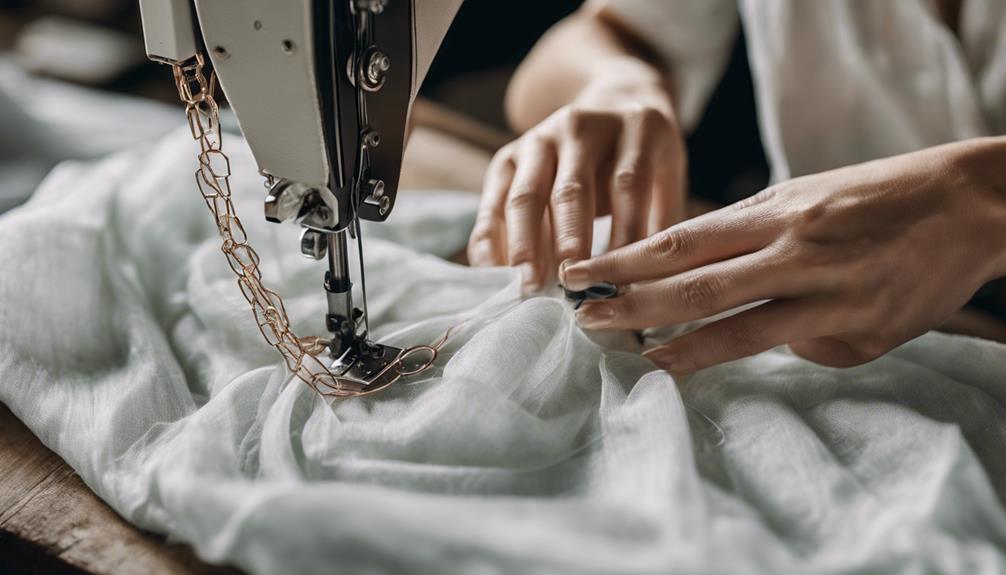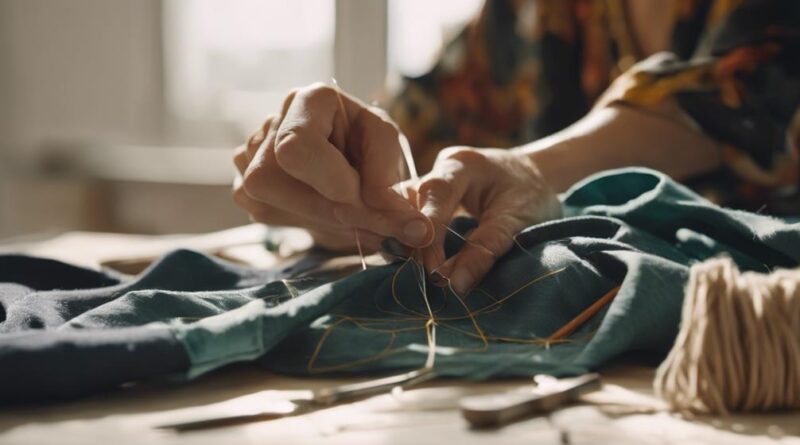Creating Sustainable Fashion With Ethically Handmade Clothing
Did you know that the fashion industry is one of the largest contributors to global pollution and unethical labor practices?
Imagine a world where your clothing not only makes a style statement but also has a positive impact on the environment and the lives of artisans. By choosing ethically handmade clothing, you can be part of a movement towards sustainability and social responsibility.
But how exactly can handmade fashion play a crucial role in creating a more sustainable future? Let's explore the intricate connection between ethical practices and timeless style.
Importance of Ethical Fashion
When considering your fashion choices, it's crucial to prioritize ethical practices in the production of clothing. Ethical sourcing and sustainable practices are key factors to keep in mind when selecting your wardrobe. Opting for clothing made through ethical sourcing means that the materials used are obtained in a responsible manner, ensuring fair treatment of workers and supporting communities. Sustainable practices not only benefit the environment but also contribute to the longevity of the fashion industry.
By choosing clothing that's ethically sourced, you're making a positive social impact. Workers involved in the production process are treated fairly and provided with safe working conditions. This promotes a more equitable and humane fashion industry. Additionally, supporting brands that prioritize ethical practices encourages other companies to follow suit, creating a ripple effect of positive change.
Environmental consciousness is another critical aspect of ethical fashion. Clothing produced with sustainable practices helps reduce waste, minimize carbon footprint, and conserve natural resources. By investing in environmentally friendly clothing, you're contributing to the preservation of our planet for future generations. Making informed choices about the clothes you wear can have a significant impact on the fashion industry and the world as a whole.
Benefits of Artisan Crafted Clothing
Artisan crafted clothing offers unique designs and high-quality craftsmanship, setting it apart from mass-produced garments in the fashion industry. When you choose artisan crafted clothing, you aren't just buying a piece of fabric; you're investing in quality craftsmanship that ensures longevity. These garments are made with attention to detail, resulting in timeless styles that transcend fleeting fashion trends. The sustainable practices employed by artisans also contribute to the appeal of these clothing pieces.
The quality craftsmanship found in artisan clothing guarantees durability, meaning your garments will last longer without compromising on style. Each piece is carefully crafted by skilled artisans who take pride in their work, ensuring that you receive a product of the highest quality. Moreover, the unique designs offered by artisan crafted clothing add a touch of individuality to your wardrobe, setting you apart from the cookie-cutter styles of mass-produced fashion.
Traditional Techniques in Fashion
To appreciate the essence of sustainable fashion fully, understanding the significance of traditional techniques in clothing production is essential. Handmade craftsmanship plays a pivotal role in sustainable fashion by preserving cultural heritage and promoting eco-friendly practices. These traditional techniques have been passed down through generations, embodying the expertise and artistry of skilled artisans.
Handmade craftsmanship involves intricate processes that require time, patience, and attention to detail. Artisans use their expertise to create clothing pieces that reflect cultural heritage and uphold traditional values. By incorporating these techniques into fashion production, designers can offer unique and authentic pieces that celebrate craftsmanship and individuality.
Furthermore, traditional techniques in fashion contribute to sustainability by reducing the carbon footprint of the industry. Handmade clothing typically involves using locally sourced materials and natural dyes, which are environmentally friendly and support local communities. This approach contrasts with mass-produced fast fashion, which often relies on synthetic materials and harmful production practices.
In essence, embracing traditional techniques in fashion not only preserves cultural heritage but also promotes sustainability and ethical practices. By supporting handmade craftsmanship, you're contributing to a more sustainable and conscious fashion industry that values quality, authenticity, and environmental responsibility.
Supporting Local Artisans
Supporting the local artisans in your community is crucial for fostering sustainable fashion practices. By investing in handmade clothing created by artisans in your area, you contribute to artisan empowerment and positively impact your community. Here's why supporting local artisans is essential:
- Artisan Empowerment: When you choose to buy from local artisans, you directly support their livelihoods, helping them sustain their craft and enhance their skills. This empowerment leads to a more vibrant artisan community.
- Community Impact: Purchasing from local artisans not only benefits the individual creators but also has a ripple effect on the community. It can create job opportunities, boost the local economy, and strengthen the social fabric of the neighborhood.
- Unique Craftsmanship: Local artisans often bring unique skills and techniques to their craft, resulting in one-of-a-kind pieces that stand out from mass-produced items. By choosing handmade clothing, you showcase and celebrate this exceptional craftsmanship.
- Cultural Preservation: Many artisans incorporate traditional methods and designs into their work, helping preserve cultural heritage. By supporting these artisans, you play a part in safeguarding these valuable cultural practices for future generations.
Supporting local artisans is a meaningful way to promote sustainability, preserve cultural heritage, and make a positive impact on both individuals and communities.
Eco-Friendly Materials in Clothing
Choosing clothing made from eco-friendly materials is a pivotal step towards sustainable fashion practices. Natural fibers play a crucial role in sustainability as they're biodegradable and renewable. Fabrics like organic cotton, linen, hemp, and bamboo aren't only gentle on the environment but also on your skin. These materials require less water and pesticides compared to conventional cotton, reducing the overall ecological footprint of the garment.
In addition to natural fibers, recycled fabrics contribute to the innovation in sustainable fashion. By repurposing materials like recycled polyester, nylon, or even reclaimed ocean plastic, fashion brands are diverting waste from landfills and reducing the demand for virgin resources. This process not only minimizes environmental impact but also promotes a circular economy where materials are reused and recycled continuously.
When you choose clothing made from eco-friendly materials, you're supporting a shift towards more responsible production practices in the fashion industry. These materials not only look and feel good but also align with your values of sustainability and environmental consciousness. By opting for natural fibers and recycled fabrics, you aren't only dressing ethically but also actively participating in the movement towards a more sustainable future in fashion.
Fair Wages for Artisans
Moving beyond the materials used in eco-friendly clothing, ensuring fair wages for artisans is essential in promoting sustainable fashion practices. When it comes to sustainable fashion, ethical production and fair trade are crucial aspects that can't be overlooked. Here are some key points to consider:
- Empowering Communities: Providing fair wages to artisans supports local communities, empowering them economically and socially.
- Ensuring Ethical Practices: Fair wages are a reflection of ethical production methods, ensuring that artisans are treated justly and with respect.
- Promoting Sustainability: Fair trade practices contribute to the sustainability of the fashion industry by creating long-term positive impacts on both people and the environment.
- Valuing Craftsmanship: Fair wages recognize the skill and effort artisans put into creating handmade clothing, promoting the preservation of traditional craftsmanship.
Transparency in Supply Chains

Ensuring transparency in fashion supply chains is essential for consumers to make informed choices about the products they purchase. When companies practice ethical sourcing and provide visibility into their supply chains, it allows consumers to understand the journey of the products they buy. This transparency builds trust and empowers consumers to support brands that prioritize fair labor conditions for their workers.
By disclosing information about where materials are sourced and how products are made, brands can showcase their commitment to ethical practices. Consumers can then feel confident that their purchases aren't contributing to exploitative labor conditions or environmental harm. Understanding the labor conditions under which clothing is produced is crucial in ensuring that workers are treated fairly and with dignity throughout the manufacturing process.
When companies are upfront about their sourcing methods and production processes, it also encourages them to uphold higher standards. Transparency holds brands accountable for their practices, pushing them to continually improve working conditions and sustainability efforts. Ultimately, by choosing to support transparent fashion supply chains that prioritize ethical sourcing and fair labor conditions, consumers play a vital role in driving positive change within the industry.
Consumer Responsibility in Fashion
Taking accountability for your fashion choices is crucial in driving positive change within the industry. When you make mindful decisions, you contribute to creating a more sustainable and ethical fashion landscape. To fulfill your role as a responsible consumer, consider the following:
- Prioritize Ethical Sourcing: Opt for brands that prioritize transparency in their supply chains and ensure fair wages and working conditions for their workers.
- Support Sustainable Practices: Choose clothing made from eco-friendly materials like organic cotton, bamboo, or recycled fibers to reduce environmental impact.
- Buy Less, Choose Well: Instead of following fast fashion trends, invest in timeless pieces that are well-made and durable, promoting a more sustainable wardrobe.
- Educate Yourself: Stay informed about the fashion industry's impact on the environment and society, empowering yourself to make more conscious purchasing decisions.
Frequently Asked Questions
How Can Consumers Ensure That the Clothing They Purchase Is Truly Ethically Handmade?
When buying clothes, it's crucial to verify that they're genuinely ethically handmade. Take on consumer responsibility by researching brands.
Look for transparency in their supply chain and fair trade practices. Choose companies that prioritize ethical sourcing. Ask questions about production methods and labor conditions.
Your choices can drive positive change in the fashion industry and support sustainable practices. By staying informed and supporting ethical brands, you contribute to a more sustainable future.
Are There Any Specific Certifications or Labels to Look for When Shopping for Sustainable Fashion?
When shopping for sustainable fashion, look for specific certifications like Fair Trade labels. These indicate ethical sourcing and transparent production practices.
These sustainable certifications ensure that the clothing you purchase meets high standards for environmental and social responsibility.
What Are Some Common Challenges Faced by Local Artisans in the Fashion Industry?
Challenges faced by local artisans in the fashion industry can range from limited access to markets and resources to competition with mass-produced goods. Finding solutions may involve creating better networking opportunities, providing training in business skills, and fostering collaborations with sustainable brands.
How Can Consumers Differentiate Between Clothing Made With Eco-Friendly Materials and Those That Are Not?
When shopping, be aware of greenwashing tactics that can mislead you about eco-friendly clothing. Look for transparency in materials and production processes to differentiate sustainable fashion trends from misleading claims. Check for certifications like GOTS or Fair Trade to ensure ethical practices.
Educate yourself on sustainable fashion practices to make informed choices that support the environment and ethical standards. Your awareness and choices contribute to a more sustainable fashion industry.
What Steps Can Companies Take to Improve Transparency in Their Supply Chains and Ensure Fair Wages for Artisans?
To improve transparency in supply chains, companies should regularly audit their processes and disclose information about suppliers.
Ensuring fair wages for artisans involves establishing clear payment structures and collaborating with ethical certification programs.
By taking these steps, companies can build trust with consumers and promote social responsibility within the fashion industry.
Transparency and fair compensation are crucial for creating a sustainable and ethical production chain.
Conclusion
When you choose ethically handmade clothing, you aren't only supporting local artisans and traditional techniques, but also contributing to a more sustainable fashion industry.
By opting for eco-friendly materials and ensuring fair wages for artisans, you're making a positive impact on the environment and the lives of those who create your clothing.
Remember, as a consumer, you have the power to make a difference through your choices in fashion. Choose ethically handmade clothing for a more sustainable future.
